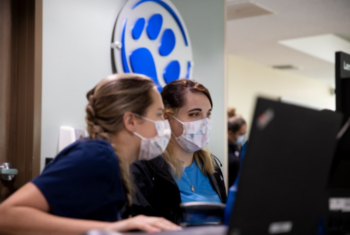In just one week last March, the industry lost seven veterinary professionals to suicide.
Since the pandemic’s onset, mental health organizations have witnessed increasing numbers of people with depression, anxiety, loneliness, and other mental health concerns. While the COVID-19 pandemic has had a profound adverse effect on the mental health of the nation, it has been particularly tough among those frontline human and veterinary healthcare workers who have continuously risked exposure to the virus to provide essential services to people and pets in need.
Researchers have long noted that veterinary professionals face disproportionately high suicide rates due to a mix of factors that include compassion fatigue, burnout, depression, and high exposure to euthanasia. In fact, according to a recent CDC study, veterinarians are up to 3.5 times more likely to commit suicide than members of the general population. Now, experts fear those numbers could be higher after this same population faced an unprecedented year of COVID-related stress, fear, and upheaval, both in practice and at home.
Rising demands.
While some industries saw a decrease in business activity during the pandemic, the demand for veterinary care spiked. This had much to do with the overall increase in pet ownership, enhanced pet owner attentiveness to pet health and wellness, and spillovers from some practice closures or limited hours of operation. In fact, BluePearl Pet Hospitals saw over 200,000 more pets in 2020 than in 2019, and of the total approximately 1.1 million pets seen in 2020, BluePearl saw 660,000 pets for the first time.
No one knows exactly why so many veterinary professionals took their life in one week this past March but one thing is clear: the profession is feeling the strain. In addition to managing changing operational and safety mandates, which included new PPE usage, curbside protocols, and requirements for client communications, as well as coping with fear and anxiety brought about by the threat of the disease, veterinary workers had to simultaneously meet rising demands at home. For many, this meant taking on another full-time role as teacher–assisting children in homeschooling and virtual extracurricular activities–while maintaining their duties as a wife or husband and meeting work requirements.
More research is needed to understand the full extent of the pandemic’s effects on the profession. However, as a veterinary social worker who has worked extensively with professionals throughout the pandemic, I know the extraordinarily high levels of stress and fatigue they continue to face,” remarked Lori C. Harbert, Director of Health and Well-Being at BluePearl. “Working through a pandemic has weighed heavy on each member of this community. Although we do not know the precise role COVID-19 has played on our Associates’ psychological health, we, as an organization, have taken extra steps this year to support and sustain our Associates’ health and well-being.”
Since the pandemic first appeared last year, BluePearl’s Health and Well-Being Team has enhanced efforts to improve Associate health and well-being. This includes launching its Microsteps to Wellness program last June and introducing the profession’s first-ever Wellness Ambassador program this week. Wellness Ambassadors who volunteer for the program will be trained in Mental Health First Aid, a public education program that teaches individuals how to identify, understand, and respond to signs of mental illnesses and substance use disorders. The training offers skills on providing timely intervention and appropriately supporting someone who may be experiencing a mental health or substance use problem or crisis.
Wellness Ambassadors will serve as liaisons between BluePearl’s 100+ hospitals and the organization’s veterinary social work and leadership teams as well as champion Associate participation in wellness programs, training, and events. BluePearl’s Health and Well-Being Team created the Wellness Ambassador program based on feedback from Associates who sought help with integrating BluePearl’s social work program within their hospitals.
Though public discourse about mental health has markedly improved over the years, we still see mental health stigmatized within the veterinary profession. It is this stigma that often prevents those in need from seeking necessary help,” explained Lori. “These Wellness Ambassadors will serve as a bridge, helping us to identify, connect, and support Associates and amplify new programs and resources as they become available. Through this program, we hope to break through the stigma, foster a culture of hope and communication, and provide our Associates with various avenues to care.”
At the core of the program, Lori says it is about Associates supporting and looking out for their fellow Associates.
To see change, there needs to be a cultural shift that begins at the hospital level. Becoming Mental Health First Aid trained says to your fellow Associates that you care, and you are there for them if they need help,” said Lori. “We see this compassion in the care our professionals provide to pets each day – this training is one way our Associates can begin to show this same compassion to one another.”
BluePearl introduced its Veterinary Social Work program into its hospitals in 2018. Today, BluePearl’s Health and Well-Being Team consists of regional veterinary social workers, a former emergency veterinarian and wellness trainer, and a nationally recognized veterinary technician and wellness trainer. BluePearl hopes to have 200 Mental Health First Aid trained Wellness Ambassadors in its practices by the end of 2022.


